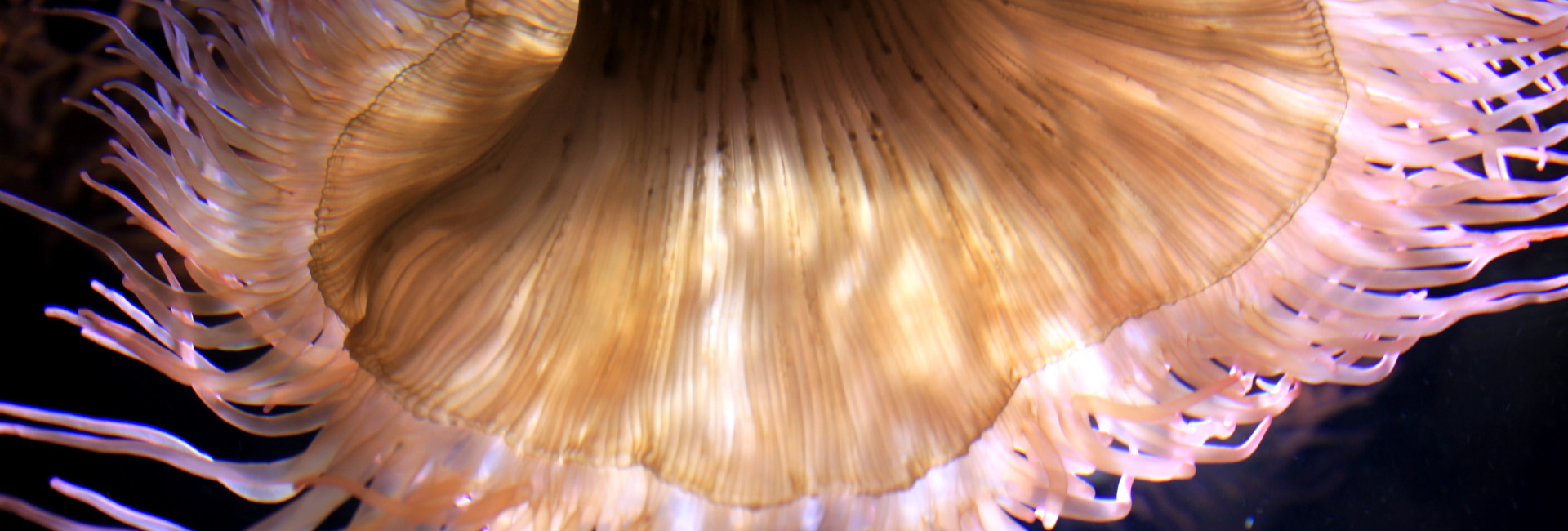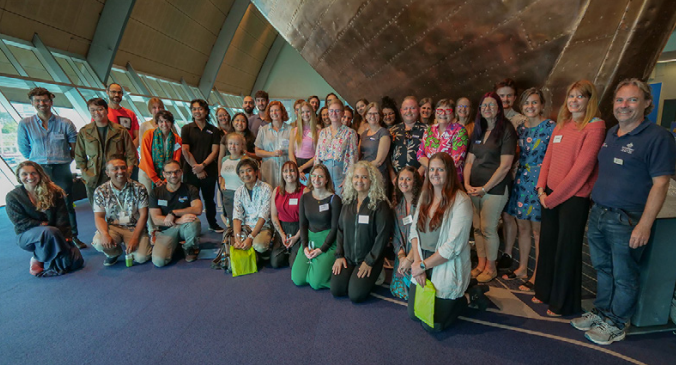Student Seminar Day
One of the primary AIMS@JCU events is the annual AIMS@JCU student seminar day. Each year, this is a successful and well attended event for students to show case the cutting edge research being conducted. Top oral and poster presentations are awarded funding to support science communication. The event is an important mechanism for students to share research findings with the broader AIMS and JCU scientific communities as well as compete for financial prizes
Abstract Booklets
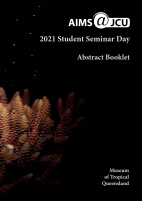 |
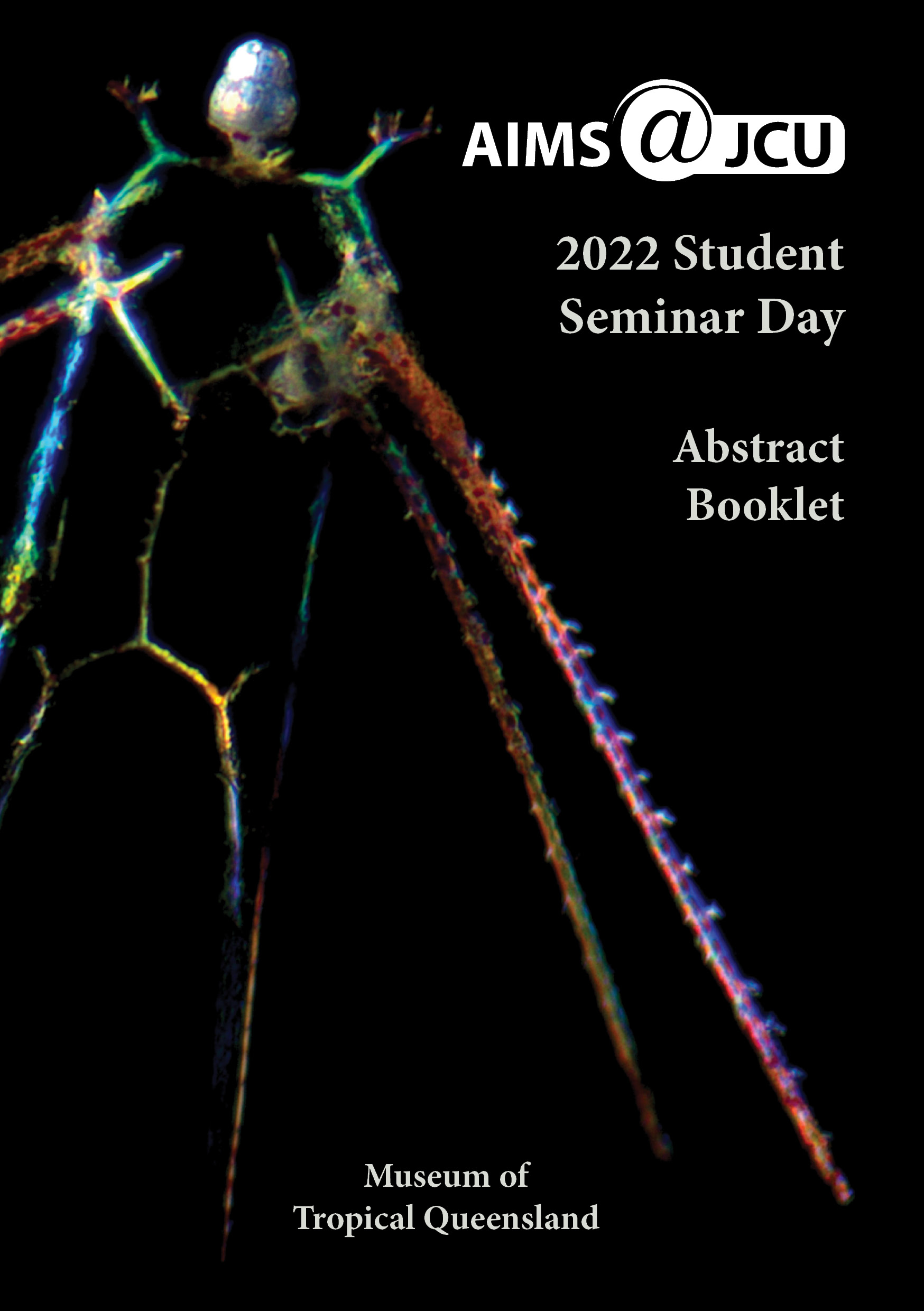 |
||||||
| 2014 | 2015 | 2016 | 2017 | 2018 | 2019 | 2021 | 2022 |
| 2006 | 2007 | 2008 | 2010 | 2011 | 2012 | 2013 |
Judging criteria can be found here.
2024 Seminar Day
In September 2024, we enjoyed another wonderful Seminar Day at the stunning Queensland Museum Tropics. The event showcased a diverse range of high-quality seminar presentations, three-minute speed talks, posters, and photographs, all highlighting the impressive work of our student members.
Congratulations to our winners:
-
Seminar talk joint winners ($900): Marko Terzin, Martina Lonati & Madeleine Sjölund
-
People’s Choice seminar joint winners ($300): Ingo Miller & Madeleine Sjölund
-
3MT Speed talk winner ($1,000): Marko Terzin
-
Runner up 3MT speed talk ($800): Marine Lechene
-
Poster winner ($800): Martina Lonati
-
Runner up poster ($600): Merle Schlawinsky
2023 Seminar Day
The 2023 AIMS@JCU Seminar Day was held at the Townsville Yacht Club on Friday, 29th September. The quality of the seminars, 3MT speed talks, poster presentations and photographs were exceptional and was truly representative of the diverse range of student research being conducted at AIMS and JCU. This day also provides an opportunity for our staff and alumni members to get involved.
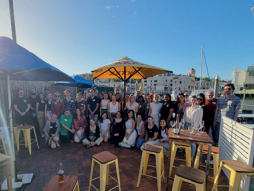
2022 Seminar Day
The 2022 AIMS@JCU Student Seminar Day was held at the Museum of Tropical Queensland on Friday, 2nd December. As always, the quality of the seminars, speed talks, poster presentations and photographs was exceptional. Thank you to everyone who contributed to both the launch of the AIMS@JCU Triennial Plan and to the seminar day itself.
The session chairs embraced the challenge and performed outstandingly; thank you Chris Brunner, Bettina Glasl, Marina Santana and Heidi Luter. It was a hard task for our judges who did an excellent job, thank you to Britta Schaff elke, Sharon Barnwell, Lyndon Llewellyn, Neal Cantin, David Bourne, Katharina Fabricius, Cherie Motti and Libby Evans-Illidge. Special thanks to Yui Sato
for his inspiring and entertaining keynote talk entitled ‘AIMS@JCU and me’.
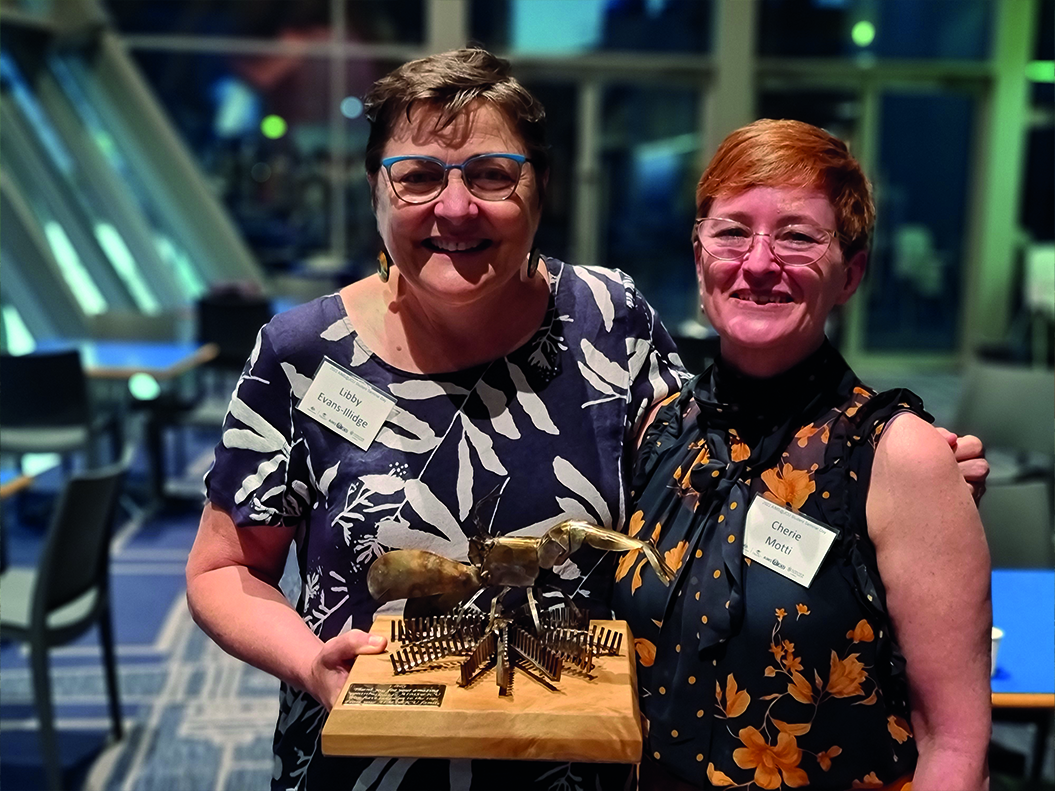
Thank you again to Libby Evans-Illidge for her exceptional leadership and dedication to the AIMS@JCU cause over the past decade and a half. A special thanks also for strengthening the alliance between AIMS and JCU and securing the future of AIMS@JCU for the next ten years. It was an honour to accept the Triennial Plan and the mantle of AIMS@JCU Research Director, and to officiate over the AIMS@JCU Seminar Day as my first duty.
Dr Cherie Motti, AIMS@JCU Research Director
.
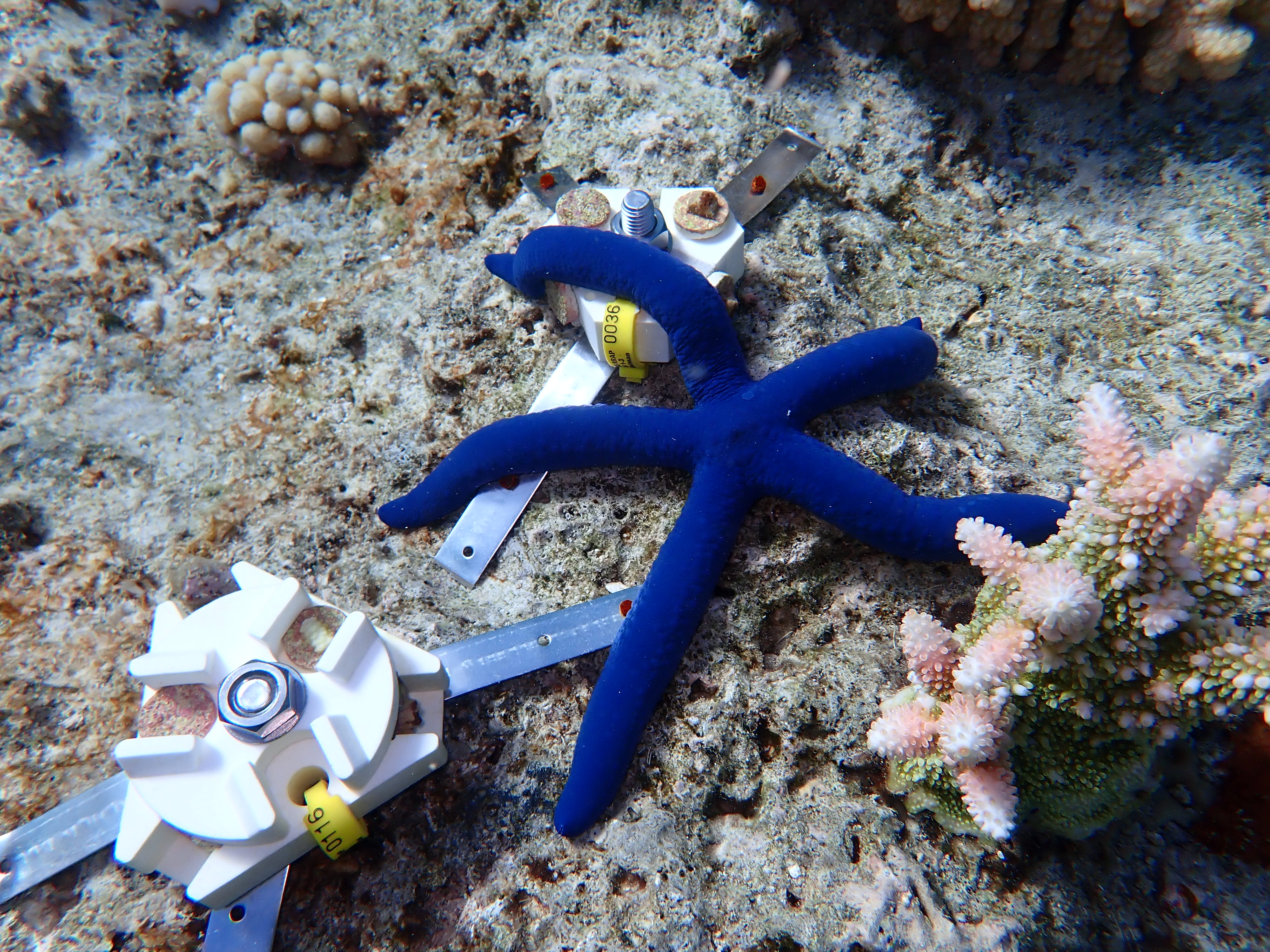 |
|
|
Research in Action: Christopher Brunner 500 samples and still smiling |
Research Subject: Taylor Whitman A warm welcome from the Linckia to the new corals on |
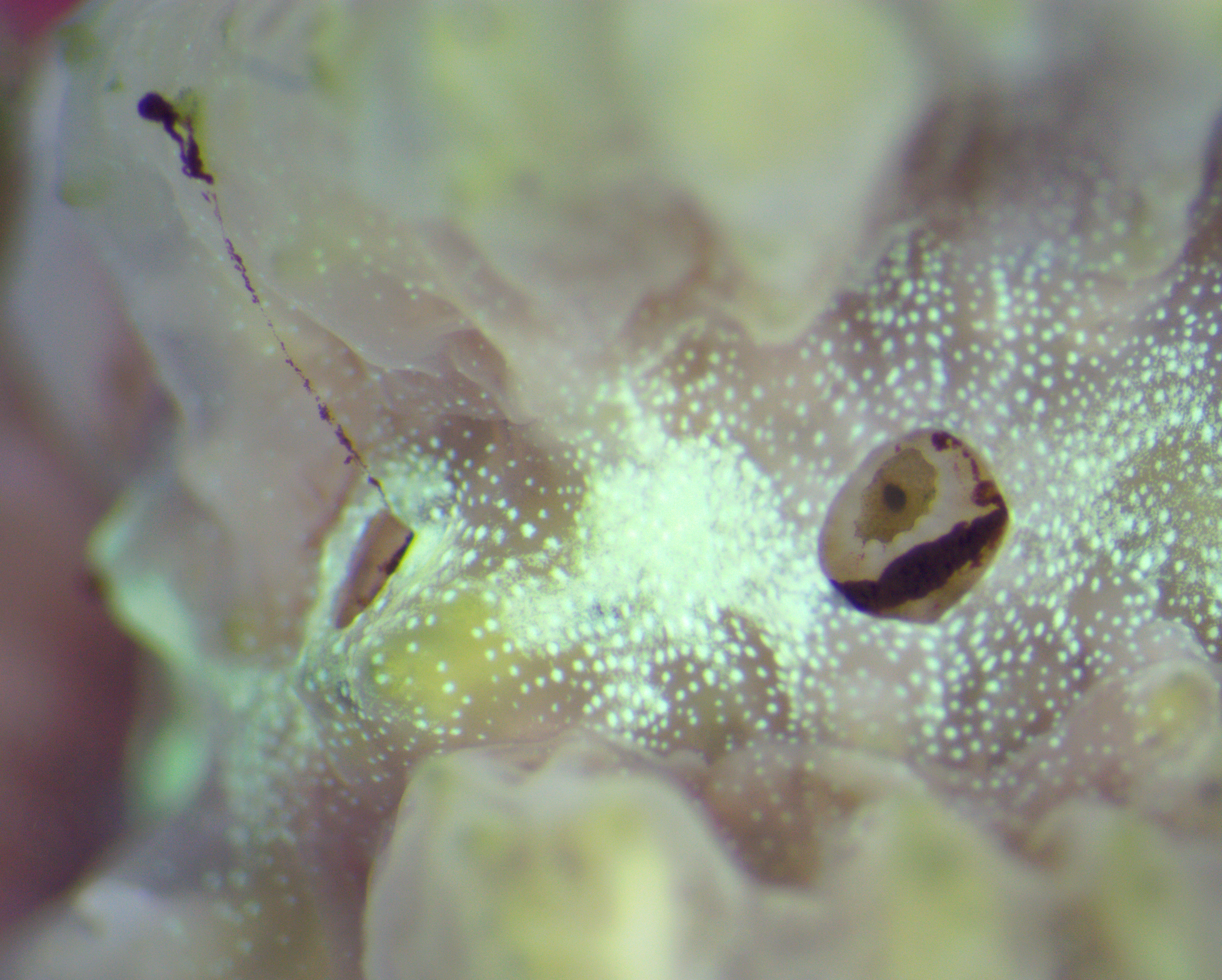 |
|
|
Photomicrograph/Macro: Corinne Allen |
People’s Choice: Marine Lechene |
|
Quantitative Marine Science: Marine Lechene |
Seminar Talk Winners
|
|
First ($1,500) |
Runner Up ($1,200) |
People’s choice ($600) |
|
|---|---|---|---|---|
| 2022 |
Kevin Bairos-Novak Demographic Drivers of Coral Population Persistence: |
Chinenye Ani eReefs modelling suggests Trichodesmium may be a major |
Kevin Bairos-Novak ($300) Demographic Drivers of Coral Population Persistence: Ramona Brunner ($300) Which receptors are responsible for settlement of Acropora |
|
| 2021 |
Annika Lamb Optimising genetic diversity of sexually produced coral stock for reef restoration |
Mikaela Nordborg Deriving the first species-specific sensitivity constants for oil toxicity- and risk modelling for tropical coral larvae |
Annika Lamb Optimising genetic diversity of sexually produced coral stock for reef restoration |
|
|
2019 |
Bettina Glasl Microbes: a new tool to monitor the reef? |
Blanche D’Anastasi Deadly Science Getaway: Elevating and connecting Aboriginal and Torres Strait Islander Women across the generations through science and authentic conversations |
Bettina Glasl Microbes: a new tool to monitor the reef? |
|
|
2018 |
Mikaela Nordborg The weakest link– Cumulative effects of heavy fuel oil and UV radiation across multiple life stages of coral |
Vanessa Haller Optimising the functional groups in ecosystem models: Case study of the Great Barrier Reef |
Mikaela Nordborg The weakest link– Cumulative effects of heavy fuel oil and UV radiation across multiple life stages of coral |
|
|
2017 |
Danielle Asson Using Generalised Dissimilarity Modelling to reclassify the bioregions of the Great Barrier Reef |
Katarina Damjanovic Exposure of coral larvae to microbiomes influences the prokaryote communities of later life stages |
Jonathan Barton Mitigating the effects of Acropora–eating flatworms on corals in captivity |
|
|
2016 |
Cecília Pascelli Diversity and function of viruses in coral reef sponges |
Gerard Ricardo Sticking and sinking: When sediments rise, coral gametes fall |
Cecília Pascelli Diversity and function of viruses in coral reef sponges |
|
|
2015 |
Brian Strehlow Understanding the impacts of dredging on sponges |
Amin Mohamed Host transcriptome analysis during onset and establishment of coral-algal symbiosis |
Adriana Humanes Eutrophication and climate change compromise the fate of early life history stages of Acropora tenuis |
|
|
2014 |
Justin Rizzari The impact of conservation areas on trophic interactions between apex predators and herbivores on coral reefs |
Pasang Tenzing The eco-physiology of two species of tropical stingray in an era of climate change |
Kathryn Berry Coal carrier spill: acute and chronic effects of coal dust on a reef-building coral, seagrass and fish species |
|
|
|
Joint Winners |
|||
|
2013 |
Martino Malerba ($2,000) Effects of nitrogen history on nitrate and ammonium uptake and cell division in the microalga Chlorella sp. |
Samantha Munroe ($2,000) Habitat selection patterns of the Australian sharpnose shark Rhizoprionodon taylori in a nearshore environment |
||
|
2012 |
James White ($2,000) A comparison of field methods for assessing boldness in fishes |
Jean-Baptiste Raina ($2,000) Identification of antimicrobial compounds produced by coral associated bacteria |
||
|
2011 |
Emily Howells ($2,500) Adaptation of Symbiodinium populations defines the fitness of coral symbioses |
Joe Pollock ($2,500) A novel assay for the detection of the coral pathogen Vibrio coralliilyticus |
||
|
2010* |
Emily Howells ($2,000) Genetic resilience of Symbiodiniumpopulations: The role of coral endosymbionts in adaptation to climate change |
Heidi Luter ($1,000) Microorganisms are not responsible for the disease-like syndrome affecting the marine sponge Ianthella basta Raechel Littman ($1,000) Responses of the coral holobiont to heat stress |
||
|
2008 |
Jean-Baptiste Raina ($2,000) Coral-associated bacteria and their role in the biogeochemical cycling of sulphur |
Paulina Cetina Heredia ($1,000) Modelling larval retention around reefs by local scale circulation features |
||
|
2007 |
Eneour Puill-Stephan Chimerism in broadcast spawning coral, Acropora millepora |
Cameron Crothers-Stomps Bacteriophage therapy for the biocontrol of Vibrio harveyi in the larval rearing system of the tropical rock lobster, Panulirus ornatus |
||
|
2006** |
Neal Cantin |
David Abrego Housing a cool guest: Contributions of different Symbiodinium clades to the physiological response of corals exposed to heat and light stress |
||
*Heidi Luter and Raechel Littman were joint winners for their talks and posters with $1,000 being awarded each.
**Highly Commended: Piers Ettinger-Epstein, Marie Magnusson and Jana Guenther.
Speed Talk (3MT) Winners
|
|
First ($1,000) |
Runner Up ($800) |
|---|---|---|
| 2022 |
Sarah L.T. Kwong Never ask a starfish its age |
Taylor Whitman Using environmental predictors of wave energy to |
| 2021 |
Taylor Whitman Joint First ($900) Quantifying the role of grazing fishes on the survival of seeded corals for direct restoration |
Geoffrey Yau Joint First ($900) The potential role of dimethylsulfoniopropionate and acrylate in coral skeleton formation |
|
2019* |
Julia Saper Augmented coral health: from planktonic prey to the procurement of putative probiotics |
Christian O’Dea Compositional and temporal stability of fecal taxon libraries for use with SourceTracker in sub-tropical catchments |
| 2018 |
Hannah Epstein ($700) Nature or Nurture: Are coral microbiomes influenced by parents or the environment? Mikaela Nordborg ($700) Let there be (UV) light |
Cecília Pascelli ($400) Viral Accessory Genes Contribute to Environmental Acclimatisation in Coral Reef Sponges |
| 2017 |
Ana Barboa Martins Towed-float GPS telemetry: a tool to assess movement patterns and habitat use of stingrays in a nursery area |
Blake Ramsby Elevated seawater temperature disrupts the microbiome of an ecologically important bioeroding sponge |
| 2016 |
Kathryn Berry Microplastic contamination in Great Barrier Reef sediments |
Carolos Bohórquez Rueda Photo-dynamic inactivation of trouble algae in public marine aquaria |
| 2015 |
Kathryn Berry** How coal affects water quality: a coral’s perspective |
Geoffrey Collins Understanding drivers of hypoxia tolerance in a tropical estuarine fish |
| 2014 |
Martino Malerba Coexistence by nitrogen partitioning and asymmetric dispersal using microalgae cultures |
Patrick Buerger Characterising bacteriophages for black band disease: potential for phage therapy? |
*Recommendation: Sam Matthews. **Also awarded people’s choice award ($200)
Poster Winners
|
|
First ($800) |
Runner Up ($600) |
|---|---|---|
| 2022 |
Cecilie R Gotze Distribution and Function of Bacterial Aggregates Within |
Marko Terzin Functional signatures of seawater microbes show increased |
| 2021 |
Rachel Neil Co-culture can significantly improve coral recruits survival and growth |
Emma Marangon Effect of age and climate stressors on the micro biome of tropical urchins across generations |
|
2019 |
Bettina Glasl Microbes: a new tool to monitor the reef? |
Mikaela Nordborg |
| 2018 | ||
| 2017 |
Samantha Sherman Are we underestimating elasmobranch abundances on BRUVS by using traditional metrics? |
Felicity Kuek Dimethylsulphoniopropionate (DMSP) production in coral-associated bacteria |
| 2016 |
Brian Strehlow Heart-less pulses: measuring sponge pumping rates |
Samuel Matthews Reconstructing and forecasting outbreaks of crown-of-thorns starfish on the great barrier reef: A metapopulation modelling approach |
| 2015 |
Cecília Pascelli Electron microscopy provides insights into the nano scale world of marine sponges |
Gerard Ricardo Move-over parrotfish: Coral embryos make next-gen mucous cocoons in response to suspended sediment |
| 2014 |
Brian Strehlow |
Danilo Malara |
| 2013 |
Amin Mohamed ($1,000) |
|
| 2012 |
Mario Espinoza ($1,000) The role of non-reef sharks in coral reef ecosystems: movements and trophic ecology of top predators along the Great Barrier Reef |
Melissa Rocker ($1,000) Thermal stress-related gene expression in corals with different symbiodinium types |
| 2010* |
Heidi Luter ($1,000) Prevalence of disease in Lanthella basta populations from the Palm Islands and Torres Strait |
Raechel Littman ($1,000) Bacterial communities of juvenile corals infected with different Symbiodinium (dinoflagellate) clades |
| 2008 |
Jasmine Jaffrés ($250) The seasonal and long-term variation of the mixed layer depth in the Coral Sea and its impact on the Great Barrier Reef |
Zoe Richards ($250) Some rare Indo-Pacific Acropora species are hybrids and some common species are polyploids |
| 2007 |
Paulina Cetina Heredia Modelling Physical and Biological processes driving larvae supply in reef systems |
|
| 2006 |
Carol Erwin |
*Heidi Luter and Raechel Littman were joint winners for their talks and posters with $1,000 being awarded each
All prize money must be used towards further science communication (e.g. travel to present at a conference, publication of an open-access paper, attend science communication training) and used while students are enrolled at JCU or relevant home university (exceptions to this are possible on application). Payment of prize funds will be by transfer to relevant research cost code at AIMS or JCU and use of funds will be dependent on approval from supervisors and in the case of conference travel, confirmed abstract acceptance. Prize money should be used and acquitted with a brief report to AIMS@JCU, within 12 months. Acknowledgement of AIMS@JCU support is required in any outputs of the funded communication initiative.
2021 Seminar Day
After a year away, it was fantastic to see so many members in person. It was a great turn out with AIMS staff making a great effort to support their students. Special thank to Neal Cantin for his inspiring keynote talk entitled ‘Where would I be without AIMS@JCU?’ and to AIMS CEO, Paul Hardisty for letting the students know they are valued as the future of Marine Science.
As always, the quality of the seminars, speed talks, posters and photos was exceptional, thank you everyone who contributed especially Redbird Ferguson for travelling to the event and Marko Terzin and Marina Santana for contributing from afar. The session chairs raised to the challenge and performed outstandingly; thank you Cecilie Ravn Gøtze, Mikaela Nordborg and Felicity Kuek. It was a hard task for our Judges who did a excellent job, thank you to Britta Schaffelke, Mia Hoogenboom, Lesa Peplow, David Souter, Pia Wimmer, Cherie Motti and Libby Evans-Illidge.
We look forward to seeing you all next year
|
Research in Action - Josephine Nielsen Keeping an eye out for all the other critters on the reef even though we are just collecting corals |
Quantitative Marine Science - Marites Canto Benthic irradiance from space: the spatio-temporal variability in the Great Barrier Reef using empirical orthogonal function (EOF) analysis. |
|
People's choice & Photomicrograph/Macro: Geoffrey Yau Gold Rush Gary |
|
|
Research Subject: Marko Terzin Chelonia mydas gliding above clear white sand. An example of how hand-drawn illustrations can be digitalised and used in publication / Science Communication purposes. The original illustration (in color) and its vectorised version (black and white). |
|
2019 Seminar Day
The 2019 AIMS@JCU Student Seminar Day (combined with the end of year function), at the Townsville Yacht Club was, as always, a wonderful event. The winners are listed below and the calibre of presentations was very high. Judges this year were Lyndon Llewelyn, Hugo Harrison, Peter Doherty, Traceylee Forester, Craig Humphrey, Gemma Wickens, Lauretta Grasso and Libby Evans-Illidge. Session chairs were AIMS@JCU students Bettina Glasl, Sam Matthews and Stacy Bierwagon.
Consistent with the new AIMS Indigenous Partnerships Plan, all presenters were asked to identify the Traditional Owners of the place where their work took place, and acknowledge them. It was pleasing to see the large extent to which this was embraced by all presenters. Thank you to AIMS Indigenous Partnerships Coordinator Traceylee Forester who made herself available to assist students with this request when they were unsure who the TOs were. Due to the last-minute cancellations of our planned
alumni keynote talk, Traceylee agreed to step into that role. She provided an informative and insightful keynote speech – this led to some very heartfelt questions and responses between Traceylee and the students, which will hopefully foster a positive relationship going forwards.
Congratulations to all of the winners and well done to everyone that presented. It’s such a great event and is wonderful when all of the hard work organising pays off. The AIMS@JCU family continues to grow and support each other, thank you for being a part of it.
Photo Competition ($100 each)
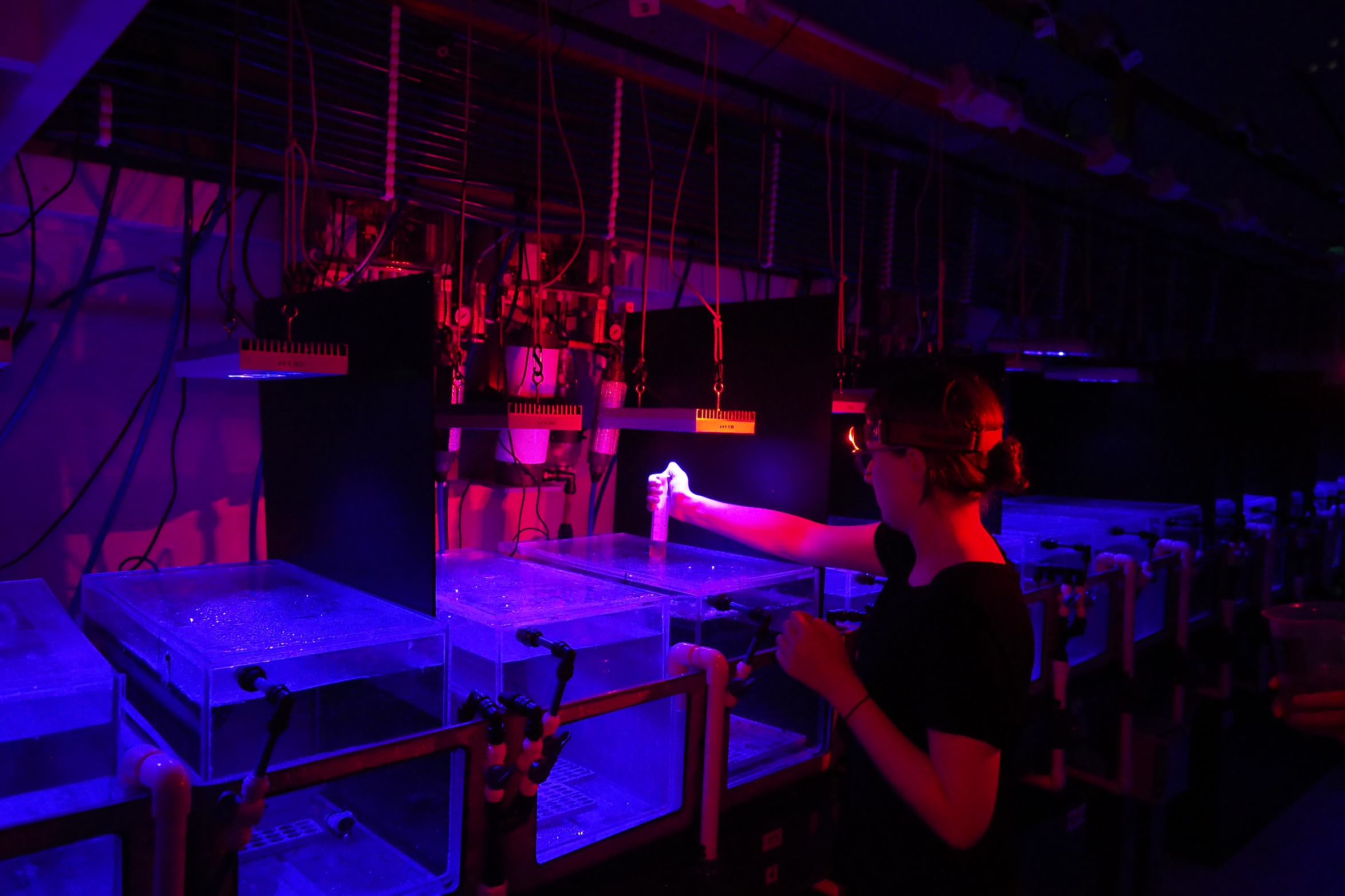 |
|
|
Research in Action: Christopher Brunner Funky coral experiments - Light studies on juvenile corals |
Research Subject: Mikaela Nordborg The peculiar & wonderfully strange behaviours of coral when under stress: Exhibit A – ‘Ballooning of tissues’ |
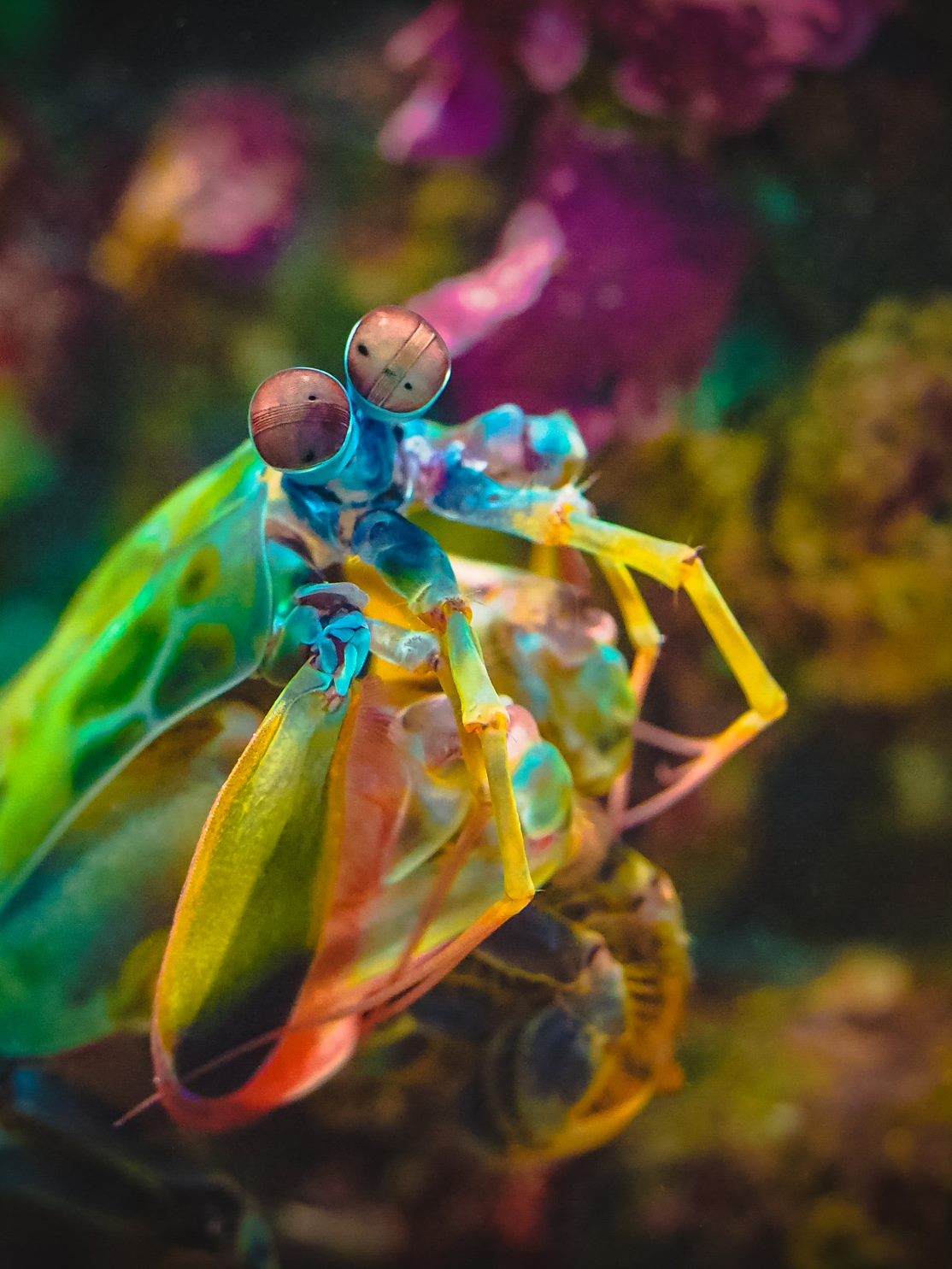 |
|
|
People's Choise & Photomicrograph/Macro: Christopher Brunner Look into my eyes - the eyes of a peacock mantis shrimp |
Quantitative Marine Science: Betina Glasl The polyamorous relationship of six marine sponge species and their microbial symbionts. |
2018 Seminar Day
As always, it was a pleasure to be a part of the annual AIMS@JCU Student Seminar Day where our student members showcase their research. The presentations were of an extremely high standard Congratulations to prize awardees.
Photo Competition ($100 each)
|
Research in Action: Mikaela Nordborg |
Research Subject: Christopher Brunner |
|
Photomicrograph/Macro: Michael Jarrold |
Quantitative Marine Science: Christopher Brunner pH profile of the upper 200 m along the entire fjord Comau (Patagonia) in 2011 and 2012. Straight black lines indicate profiles along the fjord axis measured with a pH-sensor connected to a Conductivity-Temperature-Depth multiprobe. The location of sites where Desmophyllum dianthus corals have been cross-transplanted are indicated by a triangle (Lilihuapi) and cube (Cross-Huinay) |
|
People’s Choice: Mikaela Nordborg Underwater labelling and inventory of corals to be collected |
2017 Seminar Day
We had yet another amazing AIMS@JCU student seminar day this year, with a really high standard of presentations from our student members. Special thanks goes to our judges (Peter Doherty, Rhondda Jones, Liz Tynan, Cherie Motti, Richard Davis and Kate Green); our session chairs (Felicity Kuek and Lyndon Llewellyn); and to Heidi Luter for her wonderful alumni keynote and also Nicole Webster for her inspiring closing remarks.
2016 Seminar Day
On 16th September, AIMS@JCU held another hugely successful seminar day, this year at the Museum of Tropical Queensland, Townsville. Well done to all of the presenters, as always the standard was exceptionally high and it was a very well attended event.
A big thank you to the judges: Peter Doherty, Yvette Everingham, Richard Brinkman, Hayley Gorsuch, Richard Davis, Catherine Naum and Helene Marsh; to the chairs: Elodie Ledée and Gemma Wickens; and to our key note alumni speaker: Chiara Pisapia.Just a reminder to all AIMS@JCU students who are using AIMS resources, are supervised by an AIMS staff or on an AIMS@JCU scholarship to please acknowledge AIMS@JCU in your attributions.
